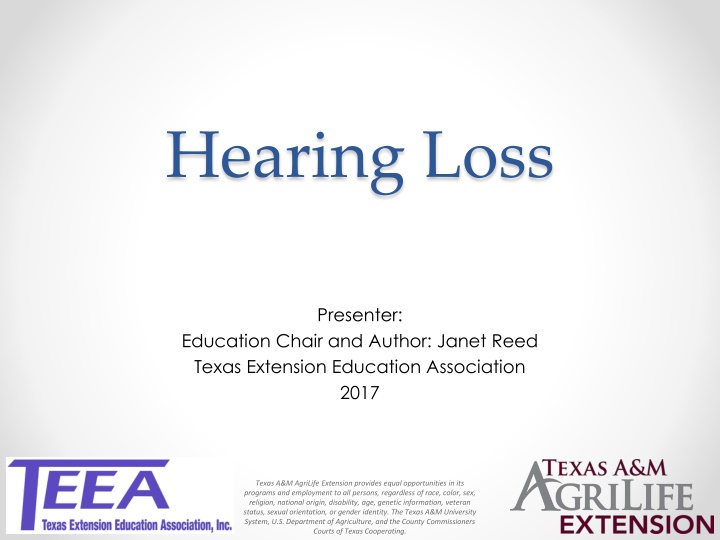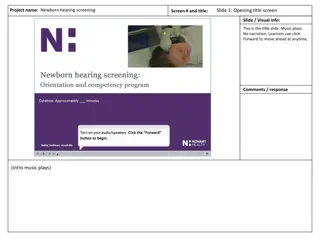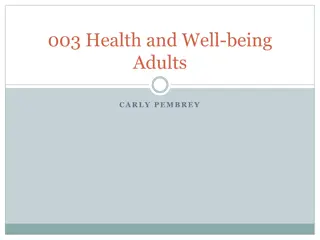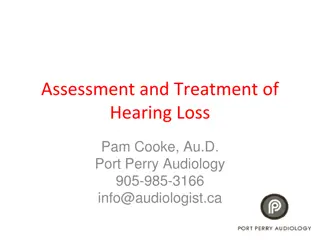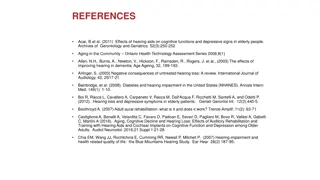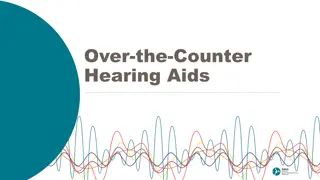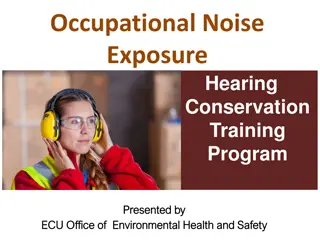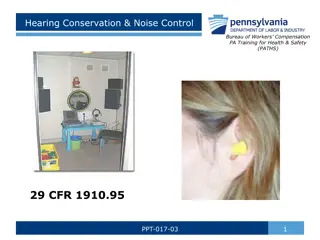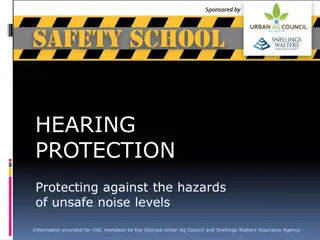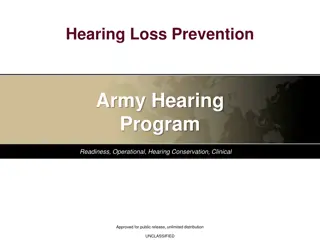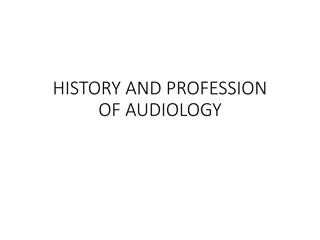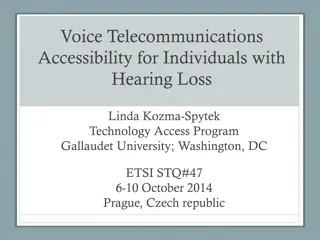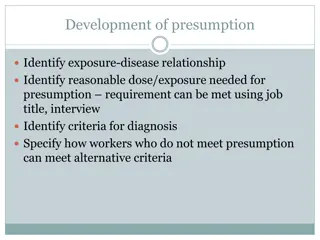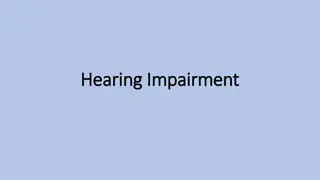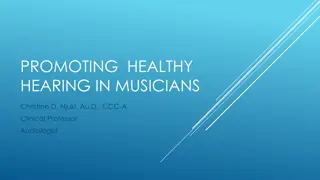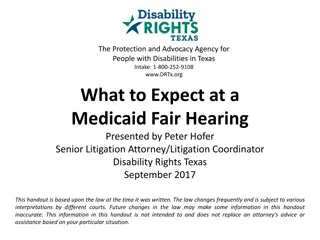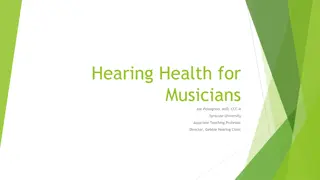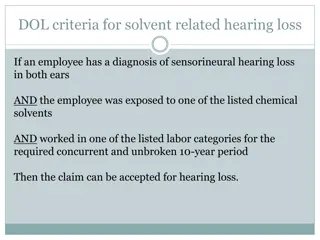Hearing Loss: Facts, Progression, and Signs
This informative content discusses various aspects of hearing loss, including its causes, progression, risk factors, signs, symptoms, and self-assessment questions. It covers how sound waves are converted into nerve signals, the three major parts of the ear, different types of hearing loss, and common risk factors. The content also provides insights into the progression of hearing loss and signs to look out for. It aims to raise awareness and educate about this important health issue.
Download Presentation

Please find below an Image/Link to download the presentation.
The content on the website is provided AS IS for your information and personal use only. It may not be sold, licensed, or shared on other websites without obtaining consent from the author.If you encounter any issues during the download, it is possible that the publisher has removed the file from their server.
You are allowed to download the files provided on this website for personal or commercial use, subject to the condition that they are used lawfully. All files are the property of their respective owners.
The content on the website is provided AS IS for your information and personal use only. It may not be sold, licensed, or shared on other websites without obtaining consent from the author.
E N D
Presentation Transcript
Hearing Loss Presenter: Education Chair and Author: Janet Reed Texas Extension Education Association 2017 Texas A&M AgriLife Extension provides equal opportunities in its programs and employment to all persons, regardless of race, color, sex, religion, national origin, disability, age, genetic information, veteran status, sexual orientation, or gender identity. The Texas A&M University System, U.S. Department of Agriculture, and the County Commissioners Courts of Texas Cooperating.
How You Hear Sound waves get converted into nerve signals that the brain recognizes as sound Three major parts of the ear o Outer ear o Middle ear o Inner ear Image Credit: National Institutes of Health National Institute on Deafness and Other Communication Disorders. Retrieved from https://www.nidcd.nih.gov/health/age- related-hearing-loss on 15 August 2017.
Causes of Hearing Loss Conductive o Problems with the ear canal, ear drum or middle ear Sensorineural o Problems of the inner ear or damage to the tiny hair cells Mixed o Combination of conductive and sensorineural hearing loss
Progression Hearing Loss Profound Mild Moderate Severe Difficulty hearing a lawn mower Difficulty hearing a whisper Difficulty hearing normal talk Difficulty hearing a motorcycle
Risk Factors for Hearing Loss Aging Loud Noise Family History Occupational Noise Recreational Noise Medication Illness
Signs and Symptoms Muffling of speech and other sounds Difficulty understanding words o Especially against background noise or in a crowd Frequently asking others to speak more slowly, clearly and loudly Needing to turn up the volume of the television or radio Withdrawal from conversations Avoiding some social settings
Do I Have a Hearing Problem? Ask yourself the following questions. If you answer yes to three or more of these questions, you may need to have your hearing checked. Do you sometimes feel embarrassed when you meet new people because you struggle to hear? Do you feel frustrated when talking to members of your family because you have difficulty hearing them? Do you have difficulty hearing or understanding co-workers, clients, or customers? Do you feel restricted or limited by a hearing problem? Do you have difficulty hearing when visiting friends, relatives, or neighbors? Do you have trouble hearing in the movies or in the theater? Does a hearing problem cause you to argue with family members? Do you have trouble hearing the TV or radio at levels that are loud enough for others? Do you feel that any difficulty with your hearing limits your personal or social life? Do you have trouble hearing family or friends when you are together in a restaurant? Adapted from: Newman, C.W., Weinstein, B.E., Jacobson, G.P., & Hug, G.A. (1990). The Hearing Handicap Inventory for Adults [HHIA]: Psychometric adequacy and audiometric correlates. Ear Hear, 11, 430-433. Retrieved from https://www.nidcd.nih.gov/health/age-related-hearing-loss on 15 August 2017.
Diagnosing Hearing Loss Talk to your health provider o It s important to determine the type and cause of hearing loss Tests to diagnose hearing loss may include o History and physical exam o Spoken word testing o X-Rays and imaging Referral to an Audiologist
Options for Treatment Remove blockage Surgery Hearing aids o Completely in the canal o In the canal o In the ear o Behind the ear Image Credit: National Institutes of Health National Institute on Deafness and Other Communication Disorders. Retrieved from https://www.nidcd.nih.gov/health/age- related-hearing-loss on 15 August 2017.
Coping with Hearing Loss Be proactive! Use your assistive device Position yourself to hear Turn off background noise Ask others to speak clearly Choose quiet settings
Reduce the Risk of Hearing Loss Keep music down Seek silence Protect your ears o Ear plugs o Beware the cotton swab Be aware of medication side-effects Get your hearing tested
Key Takeaways Hearing loss is a serious issue that affects many adults Hearing loss may be caused by a variety of issues requiring thorough evaluation by a health provider Options are available to help cope with hearing loss
Resources National Institute on Deafness and Other Communication Disorders o https://www.nidcd.nih.gov National Institute for Occupational Safety and Health o https://www.cdc.gov/niosh American Academy of Audiology o http://www.audiology.org American Speech-Language- Hearing Association o http://www.asha.org
What Questions Would You Like to Ask? References http://www.activebeat.co/your-health/listen-up-these-6-habits-cause-hearing-loss/3/ http://www.activebeat.co/your-health/8-tips-for-preventing-hearing-loss/ http://www.hearingloss.org/ http://www.mayoclinic.org/diseases-conditions/hearing-loss/basics/definition/con-20027684 http://www.mayoclinic.org/diseases-conditions/hearing-loss/expert-answers/con-20027684 http://www.hear-it.org/farmers-risk-hearing-loss http://www.hear-it.org/general-state-health-influences-hearing-loss-among-seniors http://www.hear-it.org/Alcohol-can-cause-hearing-loss http://www.hear-it.org/Cigarette-smoking-and-hearing-loss http://www.hear-it.org/diabetics-twice-as-likely-to-suffer-hearing-loss http://www.hear-it.org/cholesterol-affecting-hearing http://www.hear-it.org/Defining-hearing-loss http://www.hear-it.org/types-hearing-loss
